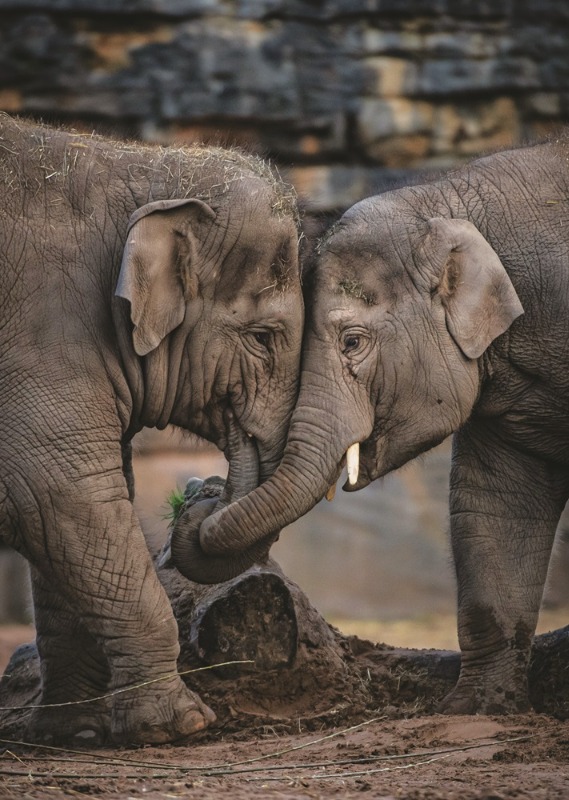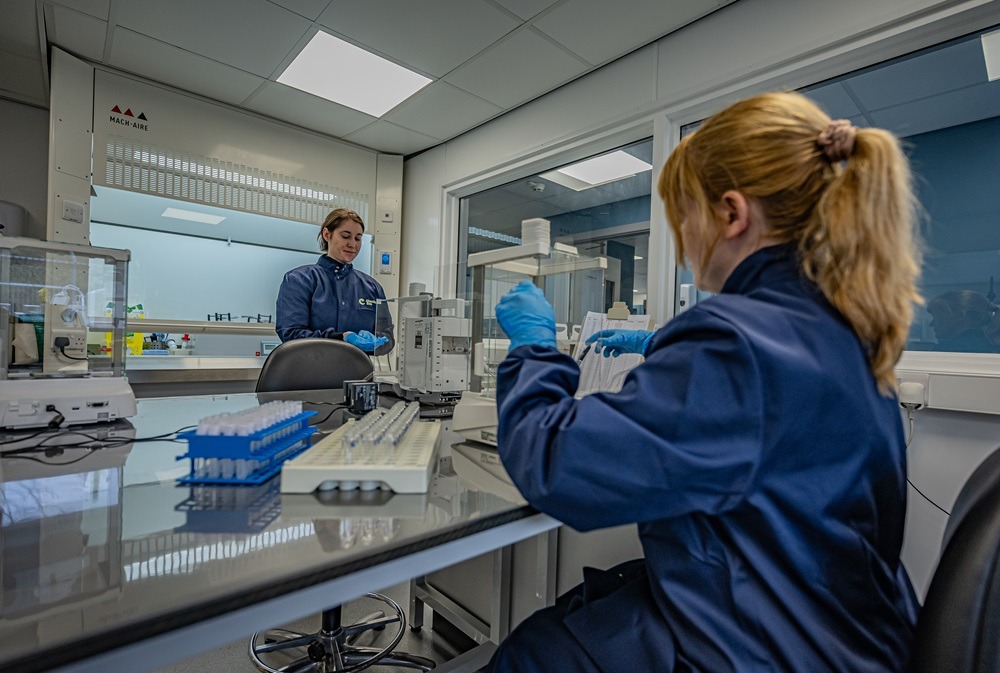search
date/time
 | Lancashire Times Weekend Edition |
7:02 AM 4th October 2025
nature
UK Scientists Develop World's First Vaccine To Protect Endangered Elephants Against Deadly Virus

Developed by leading scientists at Chester Zoo, the University of Surrey, and the Animal and Plant Health Agency (APHA), the vaccine targets elephant endotheliotropic herpesvirus (EEHV), one of the most serious threats facing young Asian elephants worldwide.
The breakthrough was published today in the prestigious journal Nature Communications, following a landmark proof-of-concept trial.
The vaccine was shown to be safe and effective in triggering a strong immune response - a crucial step toward preventing EEHV, a disease that can kill elephants in just 24 hours.
“This is a critical turning point,” said researchers involved in the study. “Until now, EEHV has been a silent killer. With this vaccine, we finally have a weapon to fight back.”

Scientists at Chester Zoo have helped to develop the world's first vaccine to protect endangered elephants against a deadly virus
The international team’s pioneering achievement represents a historic moment in global conservation efforts - and a possible lifeline for one of the planet’s most iconic and imperiled species.
This vaccine has been in development for several years and was first delivered to an elephant here at Chester Zoo in 2021. The publication of this research marks a watershed moment because it means we can now say that the vaccine is ready for wider use.
EEHV has taken the lives of so many elephants, both in human care and in the wild, but this vaccine offers hope. We can’t yet say this will be the end of EEHV deaths, but we have taken a massive step towards that goal.
A study spanning six years and involving a small group of elephants confirmed the vaccine’s safety and its ability to stimulate a protective immune response. The next phase could see a careful rollout to more elephants, prioritising young individuals who are most at risk of developing the disease.
Unlike other EEHV vaccines currently in development, the ‘ingredients’ in this new vaccine focus on T-cell activation - the body’s immune system ‘generals’ that identify and destroy infected cells.
Dr Edwards
Different scientific approaches are incredibly valuable. The more tools we have, the closer we get to a world where EEHV is no longer a threat to elephant survival.
Chester Zoo, Surrey University and APHA team opted for a T-cell-based approach using proven vaccine delivery methods. The vaccine is given via injection with booster doses, making it ideal for use in zoos and sanctuaries, with plans underway to develop delivery methods suitable for wild populations.
Dr Falko Steinbach, Professor of Veterinary Immunology at the University of Surrey and senior author of the study, said: “This is a landmark moment in our work to develop safe and efficacious vaccines. For the first time, we have shown in elephants that a vaccine can trigger the type of immune response needed to protect them against EEHV.”
Dr Tanja Maehr, from the Animal and Plant Health Agency, a lead author of the study and a former Chester Zoo Conservation Fellow, added: “Our findings give real hope that vaccination can become a practical tool for preventing severe disease and death due to EEHV. The next step could be to trial the vaccine in more calves and in range countries so we can begin to protect those most at risk.”
Experts say that without the specialised knowledge and hands-on access provided by zoos caring for the species, developing a vaccine would have been nearly impossible.
Dr Javier Lopez, Head of Veterinary Services at Chester Zoo, emphasised the scale and urgency of the effort. He said: “This project was always designed to support the global fight against EEHV. I’m incredibly proud of the team. It’s taken years of hard work, collaboration and sheer determination to get to this point.
“Now, time is critical – this disease can kill within 24 hours. That’s why we’re working to clear the legal and logistical hurdles needed to send the vaccine worldwide. As a conservation charity, our goal is for the vaccine to be open source and freely available to help save as many elephants as possible. And in the meantime, we’re sharing our knowledge so others can build and deliver the vaccine themselves, ensuring every elephant has a chance at protection.
“This is a critical turning point. Until now, EEHV has been a silent killer. With this vaccine, we finally have a weapon to fight back.”
1980-90s: The first official cases of EEHV are recorded.
2009: Chester Zoo experiences its first elephant loss due to EEHV. At this stage the international conservation community knows very little about the disease.
2007-2012: EEHV continues to cause fatalities in zoos, elephant orphanages and sanctuaries across the world. Monitoring the disease in wild populations is more difficult, but more and more wild cases begin to be recorded.
2013: Chester Zoo takes the lead on behalf of the global conservation community and spearheads a focused research project to combat the disease. The zoo launches its ‘Never Forget’ campaign to raise funds for continued research into the virus and to support vaccine development, with almost £250k in public support pledged.
2019: Indali Hi-Way, who was born at the zoo, becomes one of only a handful of recorded survivors of EEHV. The vaccine is not available yet, but she undergoes swift and intensive therapeutic treatment after developing symptoms.
2021: The world’s first vaccine has been developed by the Chester Zoo, Surrey University and APHA team. The trial begins at Chester Zoo, supported by other zoos in the UK and Ireland.
2025: The trial results are in, analysed and published. The vaccine is ready for a wider roll-out globally.
Factfile:
EEHV is present (endemic) in elephant populations. The disease, which causes haemorrhaging, has up to an 80% fatality rate once symptoms commence.
Pretty much all adult elephants carry the virus, which remains latent but may shed (become infectious), exposing other elephants to the virus.
While adult elephants have acquired immunity, young elephants have not. It takes time for the body to recognise previously unknown viruses, and most EEHV fatalities occur before the young elephant can develop a learned immune response.
The vaccine works by stimulating an elephant’s immune system before they are exposed to the virus. It targets EEHV-1A, the virus genotype most associated with fatal haemorrhagic disease.
It specifically primes the T-cells, which destroy infected cells and signal the presence of the virus to other parts of the immune system, to fight off the virus more quickly.
Unlike the viruses that cause measles and TB in humans, EEHV cannot be cultured in a lab. This means that it is not possible to inoculate elephants by introducing a weakened version of the virus so their immune systems can recognise the virus.
To tackle these problems, scientists identified two specific proteins that are only created when a strain of EEHV virus starts to replicate itself in the host’s cells. By targeting protein markers within these cells, rather than markers on the surface of the virus, T-cells are primed to specifically attack the ‘factories’ that reproduce the virus.
The vaccine is heterologous, meaning it involves delivering multiple injections with different vaccine platforms. It offers a double-pronged way of activating a vaccinated elephant’s defences.
The team developed a new blood test to check the impact of the antigens on the elephants, monitored their health and looked at more than 2,000 immune-related genes to check whether the vaccine was performing as expected. Blood samples taken from Chester Zoo elephants were analysed at the University of Surrey.
None of the vaccinated elephants showed adverse reactions to the injections.
The effectiveness of the vaccine will be measured in the long term by looking at the health of herds and whether recorded instances of EEHV decrease.
The researchers are clear that this is not the end of the fight against EEHV. The team has pledged to keep working to provide the best possible defence against the virus.
Pretty much all adult elephants carry the virus, which remains latent but may shed (become infectious), exposing other elephants to the virus.
While adult elephants have acquired immunity, young elephants have not. It takes time for the body to recognise previously unknown viruses, and most EEHV fatalities occur before the young elephant can develop a learned immune response.
The vaccine works by stimulating an elephant’s immune system before they are exposed to the virus. It targets EEHV-1A, the virus genotype most associated with fatal haemorrhagic disease.
It specifically primes the T-cells, which destroy infected cells and signal the presence of the virus to other parts of the immune system, to fight off the virus more quickly.
Unlike the viruses that cause measles and TB in humans, EEHV cannot be cultured in a lab. This means that it is not possible to inoculate elephants by introducing a weakened version of the virus so their immune systems can recognise the virus.
To tackle these problems, scientists identified two specific proteins that are only created when a strain of EEHV virus starts to replicate itself in the host’s cells. By targeting protein markers within these cells, rather than markers on the surface of the virus, T-cells are primed to specifically attack the ‘factories’ that reproduce the virus.
The vaccine is heterologous, meaning it involves delivering multiple injections with different vaccine platforms. It offers a double-pronged way of activating a vaccinated elephant’s defences.
The team developed a new blood test to check the impact of the antigens on the elephants, monitored their health and looked at more than 2,000 immune-related genes to check whether the vaccine was performing as expected. Blood samples taken from Chester Zoo elephants were analysed at the University of Surrey.
None of the vaccinated elephants showed adverse reactions to the injections.
The effectiveness of the vaccine will be measured in the long term by looking at the health of herds and whether recorded instances of EEHV decrease.
The researchers are clear that this is not the end of the fight against EEHV. The team has pledged to keep working to provide the best possible defence against the virus.